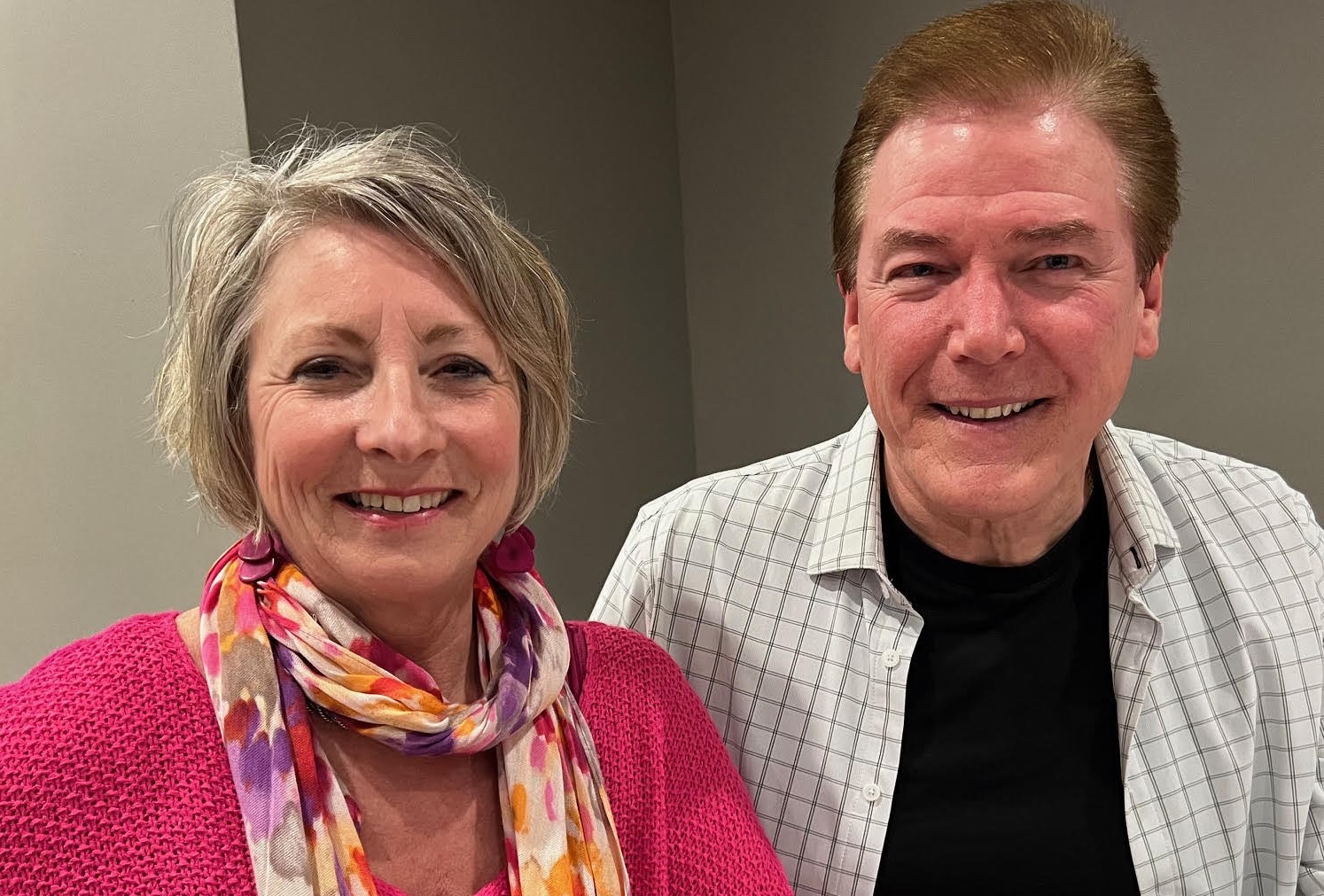
Effective Leadership Influence in a Culture of Fear and Distrust (Influencers Podcast with Dave Donaldson and Scott Young)
The leadership development interview with Scott Young of the Influencers Podcast went nothing like the pre-show conversation I had with Dave Donaldson! Yet, our conversation about Next-Gen and Millennial leadership spotlighted important insights.
This is how Scott promotes our conversation:
- Desperate for a change in leadership?
- For someone you can trust?
- Someone with clarity, character, and competence?
- What if the leader that needs changing is you?
Leadership coach, speaker, and author Danita Bye is well-versed in leadership solutions. Leadership is a calling but not everyone is equipped, especially when leading millennials, the largest generation group.
Bye’s insight reveals that between our culture, media, and contentious political and educational landscapes, trust has eroded for most, especially for millennials. Complicate that issue with AI concerns, or cancel culture pointing the finger at everyone for everything, and fear dominates, making trust seem unachievable. Fear and lack of trust are debilitating and stifle all of us in areas of leadership, achievement, and creativity.
Join Bye as she unfolds common sense strategies from practical scenarios that enable you to come alongside the millennial temperament and will enrich your understanding of effective, trustworthy leadership.
Quite an Intro! Here are my Show Notes that I used for planning the interview on the Influencers Podcast. As mentioned, Scott took a different track. So, to get the full story, you may want to both read the Show Notes, as well as listen to the Influencers Podcast.
Influencer Podcast Show Notes
1. Danita, before we get to Danae’s story, tell us about the Era of Exponential Progress. What do you mean by that?

Some financial experts say we’re in an Era of Exponential Progress. It’s exciting for some. For others, it’s one more thing that produces fear and stress.
What does Exponential Progress look like?
Here are a few examples…
- Cars drive themselves.
- Robots clean our houses.
- DNA-change kits are available if you don’t like how you’re made.
Then there’s ChatGPT. There are many positives to ChatGPT. And, the downsides are sobering. Our culture, (maybe humanity), could be at stake.
Plus, MSM and SM headlines fuel a fear frenzy on a daily basis:
- How do we deal with a steady increase in fuel and food prices?
- How might we invest our money when the stock market may crash at any moment?
- What do we do with the doom-and-gloom predictions about the future?
Let’s be real – there’s a lot of uncertainty in the world. However, I believe it’s especially stressful for our young leaders.
2. How does this turmoil impact our Next Gen leaders?
In a recent survey, this is how university students respond to the statement, “I have felt increased stress about….”
- 71%: a loss of social connections, and social isolation.
- 69%: anxiety or depression.
- 61%: physical health for me or a family member.
Fear is at the core of these alarming statistics. Fear sabotages creativity and keeps us stuck. Dr. Mark McDonald, the author of the book, United States of Fear, describes what he observes…“When fear is the predominant emotion, it overpowers every other feeling. It overpowers love. It overpowers hate. It also paralyzes the rational faculties. It also makes it impossible to think.”
Let’s be real. With the craziness happening in our world, it’s easy to get stuck in the Fear Zone. When you do, these are some of the consequences:
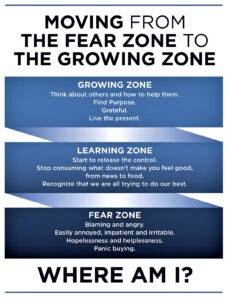
- Focus is scattered.
- Engagement at work drops.
- Resiliency is compromised.
Relationally:
- Relationships and collaboration suffer.
- Patience and communication deteriorate.
- Trust flies out the window.
Physically:
- Immunity lowers.
- Stress hormones slow, or shut down, some body functions.
- Gut health, where most of the immune system resides, is affected.
In contrast, scripture says, “I have not given you a spirit of fear, but of power, love, and a sound mind.”
It is up to us, the seasoned leaders, to guide and coach our young people out of the Fear Zone, into the Learning Zone. Then, they will flourish in the Growth Zone. That’s why your leadership matters now, more than ever before.
3. How do we coach and mentor future leaders today? In the intro, you talked about the leadership lessons embedded in your daughter’s Kilimanjaro experience. When you talk with Danae, what did she learn about moving from the Fear Zone to the Learning Zone and to the Growth Zone?
Before Danae tackled Kilimanjaro, she researched to learn why some climbers fail to make it to the top.
These failures provide insights for leading, mentoring, and coaching emerging leaders. Did you know that 50% of climbers don’t make it to the summit of Kilimanjaro? 50%! That astounds me. Here are the 3 reasons:
- Wrong route
- Wrong mindset
- Wrong guide
So, in coaching and mentoring emerging leaders, we can help them find the…
- Right route
- Right mindset
- Right guide
4. That sounds intriguing. Let’s start with the “wrong route.” What did Danae learn about the “right route”?
For some climbers, the shortest route looks like the “easy route.” Problem – the “easy route” doesn’t allow enough time for their bodies to adapt to the changing conditions. This is what Danae says….
“You start off in Bushland. It’s hot and dry. Then you move through a Rainforest Zone. It’s warm and humid. At 13 000 ft you hit the Moorland Zone, and then the Alpine Desert Zone. With the rise in altitude, animal and plant life all but disappears and it’s getting colder. At 16,500 ft, you’re in the Arctic Zone!”
Some climbers who choose the shortest route, fail due to a lack of oxygen.
So, when we’re coaching Next-Gen leaders, what causes them to have a lack of leadership oxygen? What is their “wrong route?”
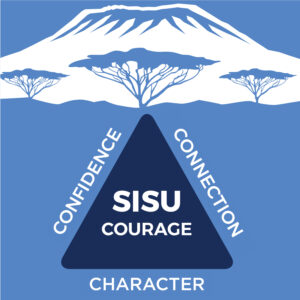
Unfortunately, in times of chaos, many get stuck in the Fear Zone. The result? A host of unproductive behaviors.
This is where we, as leaders, can be change agents. We invite Next-Gen leaders to develop an Ownership Mindset. My favorite coaching strategy is to ask them to challenge themselves with questions like these:
- What might I do to accomplish my goals?
- What might I do to resolve the situation?
- What might I do to take a positive step forward?
- What might I do to (fill in the blank with a desired future outcome)?
This is a solution-oriented question, geared towards sparking ownership. It’s not a finger-pointing question. It’s a question that sparks an Ownership Mindset.
The “right route” is building an Ownership Mindset.
Top Tip: An Ownership Mindset tackles FEAR by boosting your ability to create a hope-filled vision for a better future.
5. Let’s get to the next Kilimanjaro Leadership Lesson. What is this“wrong mindset” that sabotages some climbers from getting to the top of that mountain? And what is the mindset that sabotages young leaders from reaching their goals and dreams?
A negative mindset stops some climbers from getting to the top of Mount Kilimanjaro.
The “wrong mindset” traps you in the 3C negative cycle: Criticize, Condemn, and Complain.
- Criticism saps your confidence. You begin doubting that you have the leadership skills to tackle challenges and obstacles.
- Condemning creates confusion. You lose focus on your vision, values, and virtues.
- Complaining crushes your creativity. You lack the creativity and growth mindset to see new opportunities.
A negative mindset impacts your Next-Gen leader in all 5 Capitals (wealth that you steward):
- spiritual/motivational,
- relational,
- physical,
- mentally/intellectually, and
- financial
6. So, how do we coach and mentor young leaders to avoid the “wrong mindset trap?
The climbing gets difficult. Danae fights getting stuck in a negative mindset trap. She says:
“I always knew that one of the most important attributes to make it to the top is not physical ability. It’s the mindset of believing that you will make it. This is what distinguishes those who make it to the top from those who don’t. I never realized how much I would have to draw on positive thoughts.”
With extreme conditions, Danae is intentional in recognizing and confronting her negative thoughts. Then, she turns them into a driving force that keeps her moving forward.
As a leader of Next-Gens, you can do the same. We can foster a Grateful Mindset (Confidence).
Here are some insights to work through with the young leader you coach. This exercise will remind them of their resources…
Spiritually & Motivationally
1 Thessalonians 5:16-18 reminds us that we need to be grateful – even when climbing a daunting mountain! “Rejoice always, pray without ceasing, give thanks in all circumstances; for this is the will of God in Christ Jesus for you.”
The key phrase here is…” in all circumstances!” No matter what you’re up against, gratitude is the antidote to a negative mindset.
Relationally
Gratitude enables you to connect on a deeper level with people. You build meaningful social bonds. You stop comparing yourself to others and start respecting each person for their unique gifts. Instead of criticizing, condemning, and complaining about others, you collaborate with them. Everyone benefits.
Physically
Gratitude has a myriad of health benefits. A grateful mindset contributes to a lower heart rate; lower blood pressure; better quality of sleep; and less physical stress! At a time when we are more aware of health and well-being, this is an excellent way to boost your immunity – and it’s free!
Mentally
Gratitude bolsters your self-worth and self-esteem. You become more resilient and less likely to suffer from burnout. Gratitude helps you cope with trauma, and reduces feelings of anger. By eliminating these negative emotions and feelings, you get the energy boost you need to move to the top. (I recommend reading Feeling Good, The New Mood Therapy. Psychiatrist, David D. Burns, shares scientifically proven techniques to help you develop a positive outlook on life.)
Financially
Gratitude is the best investment for your future! When you’re healthy spiritually/motivationally, relationally, physically, and mentally, you’ll be amazed at how much better you’ll be able to focus on and grow your financial health.
So, the “right mindset” is a Grateful Mindset. We can empower them to realize these truths:
- That which is meant to break you, can build you.
- That which is meant to destroy you, can deliver you.
Top Tip: A Grateful Mindset tackles FEAR. Gratefulness gives you the energy boost needed to harness your resources.
7. Then we get to the last climbing failure – choosing the “wrong guide.” A “right guide” can support our future leaders on their growth journey
A trusted, experienced, and skilled guide is a must-have in the “mountaineering kit” for all adventurers. This is true when you are climbing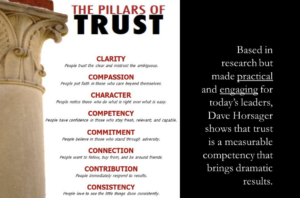
This is what Danae says:
“On the final day of our hike, my headlamp goes out. My guide sees this, and without a word, hands me his. During the final hours of our climb, there are times when we get separated. One of the guides stays behind with some of the members to allow them to rest some more. We keep moving step by step for another hour.”
So, how can we, as leaders, be that guide to the young people we coach and mentor?
It’s about trust. It’s not easy finding a guide whom you can trust. Authentically sharing your weaknesses is scary. Trusting your guide to work with you to overcome them is tough too. That takes courage. So…be trustworthy. Challenge your up-and-coming leaders to be trustworthy too.
In Millennials Matter, I feature my go-to trust expert, David Horsager. His Trust Guidelines, based on the 8 Trust Pillars, named The Trust Edge, are a valuable framework. These are useful when mentoring and coaching emerging leaders. Be the guide who displays these traits. Plus, encourage these traits in your next-gen leaders:
- Clarity: Be clear about your vision, values, and virtues.
- Compassion: Have the other person’s best interest in mind.
- Character-based: Do what is right, over what is easy.
- Competent: Stay fresh, relevant, and innovative.
- Committed: Sacrifice for the greater good.
- Connected: Collaborate and learn from others.
- Contributing: Deliver real results (not just talk).
- Consistent: Be steady and dependable in your attitude, behavior, and approach.
We are fortunate if we find a guide here on earth whom we can trust! As Christian leaders, we have the assurance that our heavenly guide can always be trusted.
“Those who know your name will trust in you, for you, LORD, have never forsaken those who seek you.” (Psalm 9:10 NIV)
Top Tip: Being Trustworthy tackles FEAR. It provides the support needed to have strong connections.
8. What you’re saying, Danita, is that by coaching our next-generation leaders to choose the right route, embrace the right mindset, and work with a trusted guide, they can be leaders of power, love, and a sound mind. We don’t need to be dominated by Fear.
Our leadership matters – now more than ever.
In heeding these Kilimanjaro Leadership Lessons, we empower the Millennials on our teams. We can coach them to move from the Fear Zone to the Learning Zone, so that they can thrive in the Growth Zone!
In conclusion, I’d like to share how Danae summarized her Kilimanjaro experience…
“I look at my friends. This is a perfect moment. This is the moment I will think about long into the future. A moment that defines me as being “Kichwa Moto” (my Tanzanian nickname, meaning stubborn – not willing to give up on myself. and not willing to give up on the people around me.)
At this moment I realize that when people believe in each other and push each other, mighty things happen.”
These are tumultuous times! Era of Exponential Progress. Digital Disruption. We can climb the mountains alongside our Millennials and future leaders. We can do the following:
- Ownership (Character): Guide them towards the “right route” of taking ownership, vs. blaming others.
- Gratitude (Confidence): Encourage them to focus on developing the “right mindset,” one that focuses on the positive and finding innovative solutions.
- Trust (Connection): Be the “right guide,” a guide whom they can trust to never give up on them. Effective Leadership in a Culture of Fear and Distrust
Listen to the Podcast HERE.
P.S. Here are other resources from Dave Donaldson:
- CityServe: Your Guide to Church-Based Compassion. I contributed a chapter on Millennial Leadership.
- Restore America Tour, National Faith Advisory Board.
P.P.S. To catch the entire Courage Leadership series, check out these articles:
- Leadership Strategy Insights from Courageously Taking On Mount Kilimanjaro
- A Courageous Character Keeps Your Leadership Development Journey on Track
- Gratitude Builds Courage to Confidently Turn Scary Times into Leadership Development Adventures
- How to Courageously Connect to Improve Your Leadership Performance
- How Courage Enables You to Reach the Top of Every Leadership Development Mountain
Copyright 2023, Danita Bye. All rights reserved.
Let’s discuss a tailor-made interview to meet your audience’s needs.
Virtual speaking event? No problem!
Check out my Speaker page HERE.
To schedule, a call contact me at danita@danitabye.com

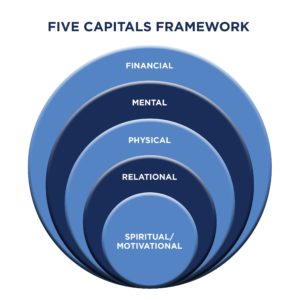

No Comments